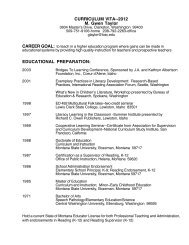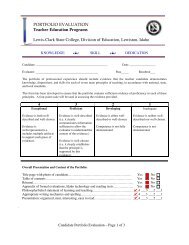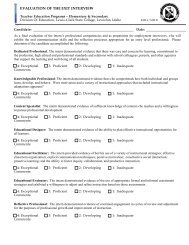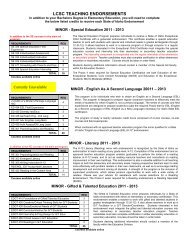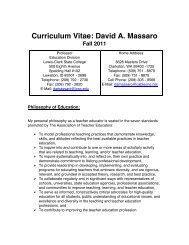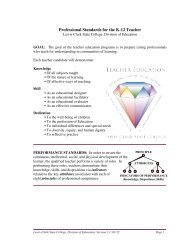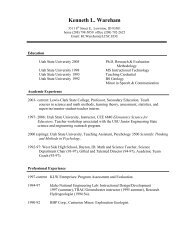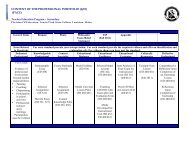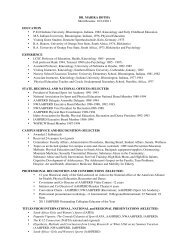PACE - LCSC Education Division - Lewis-Clark State College
PACE - LCSC Education Division - Lewis-Clark State College
PACE - LCSC Education Division - Lewis-Clark State College
Create successful ePaper yourself
Turn your PDF publications into a flip-book with our unique Google optimized e-Paper software.
5: The culturally responsive educator works closely with parents, family and community members to achieve a highlevel of complimentary educational expectations between home and school.Related Competencies--The teacher candidate consistently:• Promotes extensive parental interaction and involvement in her/his children's education. (S, D)• Seeks to continually learn about and build upon the diverse experiences and knowledge that students bringwith them from their homes and community. (K, D)• Seeks to learn other languages demonstrated within the community and to promote their use in instruction.(K, D)Possible Definitions:"Culture" is defined as the belief systems and value orientations that influence customs, norms, practices, lifestylesand social institutions, including psychological processes (language, care taking practices, media, educationalsystems) and organizations (media, educational systems; Fiske, Kitayama, Markus, & Nisbett, 1998). Inherent inthis definition is the acknowledgement that all individuals are cultural beings and have a cultural, ethnic, familial,spiritual and racial heritage. It also encompasses a way of living informed by the historical, economic, ecological,and political forces on a group. These definitions suggest that culture is fluid and dynamic, and that there are bothcultural universal phenomena as well as culturally specific or relative constructs. (American PsychologyAssociation)Culture is defined as a way of life, especially as it relates to the socially transmitted habits, customs, traditions andbeliefs that characterize a particular group of people at a particular time. Culture is the lens through which we lookat the world. It is the context within which we operate and make sense of the world and it influences how we processlearning, solve problems, and teach. (NWREL)The PrincipleExhibiting Expertise in Subject(s) Taught:THE CONTENT SPECIALISTThe successful teacher is one who understands the central concepts, tools of inquiry, and structures of thediscipline(s) he or she teaches. The teacher maintains currency in knowledge of the content area(s) and skills of thediscipline.Key AttributeThe teacher understands the central concepts, tools of inquiry, and structures of the discipline(s) he or she teaches.The teacher maintains currency in knowledge of the content area(s) and skills of the discipline.Indicators of Performance1. The teacher understands the central concepts, tools of inquiry, and structures of the discipline(s) he or sheteaches.• The teacher understands and is skilled in the major concepts, assumptions, debates, processes ofinquiry, and ways of knowing that are central to the discipline(s) s/he teaches. (K, S)63



